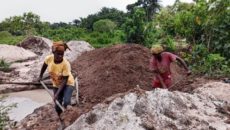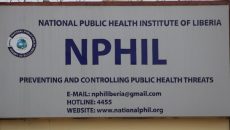Take a walk around Monrovia and observe the displays of risk employees face every day. Some employees do not make it back home to their families in the same condition as they started the day. In some industrial companies, employees are exposed to chemicals.
Visit construction sites around town and employees work without earplugs, nose masks, steel-toed boots, or any personal protective equipment in general.
Visit some public and private offices, schools, and entertainment centers around Liberia and ask for the lavatories. You would have to be breathless to use these facilities because inhaling the bad smells might leave you unconscious.
There are many occupational and safety issues everywhere in Liberia, from damaged sewer pipes across Monrovia to failed electrical appliances, to buildings being painted without nose masks, to exposure to excessively loud sounds without earplugs, to working in offices without any functional fire extinguishers, fire or smoke alarms, exit and entry signs – we live and work with these risks every day.
There are many occupational injuries daily across the country. Are employers honestly reporting to the Ministry of Labor as is required by law? Does the Ministry of Labor even have qualified occupational injury staff to follow up? Many employees feel like they have no other option than to comply with their employers and work in those unsafe and unhealthy environments because of the limited employment options in the country.
How does the government even hold institutions and employers accountable when occupational health risks and death traps are seen right under the eyes of relevant government institutions without any sense of the risks or finding solutions for them?
Public and private health facilities are incapable of treating some of the medical occupational injuries and complications. Employees are sometimes dismissed for their incapacity to perform on the job or continue with the lifetime complications. If they’re lucky, they are sent abroad by their employers, but in very rare circumstances.
Occupational health and safety issues, if not managed properly in Liberia, will rob the country of the needed skills and talents.
The National Public Health Institute of Liberia needs to extend its mandate to establish a regulatory board on occupational health and safety administration, set guidelines, and ensure that all institutions comply with the regulations through regular monitoring. The Ministry of Labor alone is not capacitated to manage occupational and health and safety issues in Liberia.
The government also needs to draft policies that will oblige all institutions operating in Liberia to obtain insurance policies in case employees or daily workers get injured or develop health complications because of job conditions.
Moreover, employers must understand fully how having a safe and healthy workplace can benefit employees and families, businesses, and the public at large. Employers must know that their everyday job is to keep the workplace safe and healthy. Each organization must advance a robust system for establishing safety and health efforts by employees in the workplace.
Employers must be proactive in understanding and following the law for the work they do, even if the Ministry of Labor is not doing its proper job. Organizations must address definite hazards at work through safety meetings with staff. A culture of safety should be cultivated with communal deference and open announcement. Finding out the best solutions to safety and health problems should be the aim, with employees given the opportunity to ask questions about health and safety issues.
Featured photo courtesy of Christina Morillo



